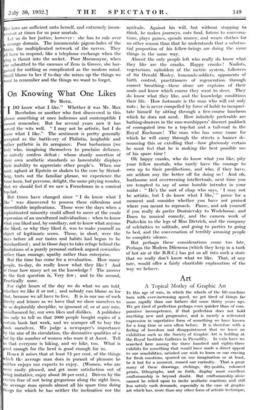On Knowing What One Likes
BY MOTH.
T DO know what I like." Whether it was Mr. Max 1 Beerbohm or another who first discovered in this prase something at once ludicrous and contemptible I annot remember. But for several years now it has ,erred the wits well. " I may not be artistic, but I do now what I like." The sentiment is pretty generally ceepted as the battle-cry of Philistia, laughable and ather pathetic in its arrogance. Poor barbarians (we feel) who, imagining themselves to proclaim defiance, so naively confess defeat : whose sturdy assertion of their own aesthetic standards so lamentably displays heir inability to appreciate other people's. When our aunt, aghast at Epstein or shaken to the core by Strind- erg, trots out the familiar phrase, we experience the • ame keen, but perverse, delight, the same pitying wonder, hat we should feel if we saw a Frenchman in a comical op-hat.
But times have changed since " I do know what I like " was discovered to possess these ridiculous and discreditable implications. Those were the days when a phisticated minority could afford to sneer at the crude xpression of an uncultured individualism : when to know shat you liked and, by corollary, not to know what anyone Ise liked, or why they liked it, was to make yourself an abject of legitimate scorn. Those, in short, were the -s before all our tastes and habits had begun to be standardized ; and in those days to take refuge behind the limitations of a purely personal outlook argued cowardice rather than courage, apathy rather than enterprise. But the time has come for a revaluation. How many eople, to-day, do really know what they like ? And f those how many act on the knowledge ? The answer o the first question is, Very few ; and to the second, radically none.
For eight hours of the day we do what we are told, lether we like it or not ;. and nobody can blame us for hat, because we all have to live. It is in our use of such iberty and leisure as we have that we show ourselves to so deplorably sheeplike, so ignorant of, or at any rate, minfluenced by, our own likes and dislikes. A publisher sas only to tell us that 2000 people bought copies of a ertain book last week, and we scamper off to buy the ok ourselves. We judge a newspaper's importance • y the size of its circulation, the decorative qualities of a at by the number of women who wore it at Ascot. Tell that everyone is hiking, and we hike, too. What is • ood enough for the herd is good enough for us.
Hence it arises that at least 75 per cent. of the things hich the average man does in pursuit of pleasure he either enjoys nor expects to enjoy. (Women, who are ore easily pleased, and get more satisfaction out of ing imitative, enjoy about 50 per cent.) Driven by the raven fear of not being gregarious along the right lines, he average man spends almost all his spare time doing hings 'for which he has neither the inclination nor the aptitude. Against his will, but without stopping to think, he makes journeys, eats food, listens to conversa- tions, plays games, spends money, and wears clothes for no other reason than that he understands that a substan- tial proportion of his fellow-beings are doing the same things in the same way.
Almost the only people left who really do know what they like are the cranks. Happy cranks ! Nudists, vegetarians, upholders of the metric system, followers of Sir Oswald Mosley, lemonade-addicts, opponents of birth control, practitioners of regeneration through correct breathing—these alone are captains of their souls and know which course they want to steer. They do know what they like, and the knowledge conditions their life. How fortunate is the man who will eat only nuts ; he is never compelled by force of habit to incapaci- tate himself by sitting through a five-course luncheon which he does not need. How infinitely preferable are bathing-drawers in the sun-worshippers' discreet paddock of corrugated iron to a top-hat and a tail-coat in the Royal Enclosure! The man who has some cause for Which he will carry through the streets a banner de- nouncing this or extolling that—how gloriously certain he must feel that he is making the best possible use of his spare time !
Oh happy cranks, who do know what you like, pity your fellow mortals, who rarely have the courage to own up to their predilections, and who, if they have, are seldom any the better off for doing so ! And oh, loathsome and overweening intellectuals, next time you are tempted to say of some humble intruder in your midst : " He's the sort of chap who says, ' I may not be artistic, but I do know what I like,' " pause for a moment and consider whether you have not praised where you meant to reproach. Pause, and ask yourself if you really do prefer Dostoievsky to Wodehouse, and Ibsen to musical comedy, and the camera work of Pudovkin to the legs of Miss Dietrich, and the company of celebrities to solitude, and going to parties to going to bed, and the conversation of terribly amusing people to complete silence.
But perhaps these considerations come too late, Perhaps the Modern Dilemma (which they keep in a tank of hot air at the B.B.C.) has got us all into such a state that we really don't know what we like. That, at any rate, would offer a fairly charitable explanation of the way we behave.






























 Previous page
Previous page